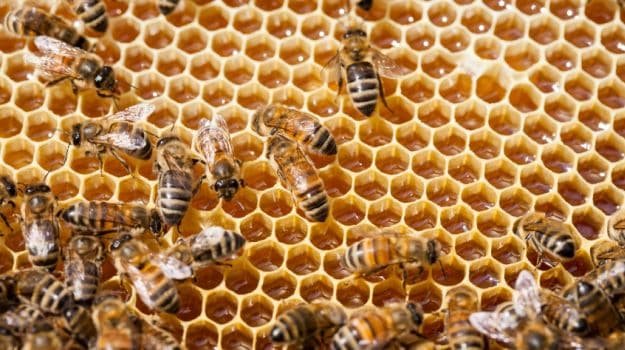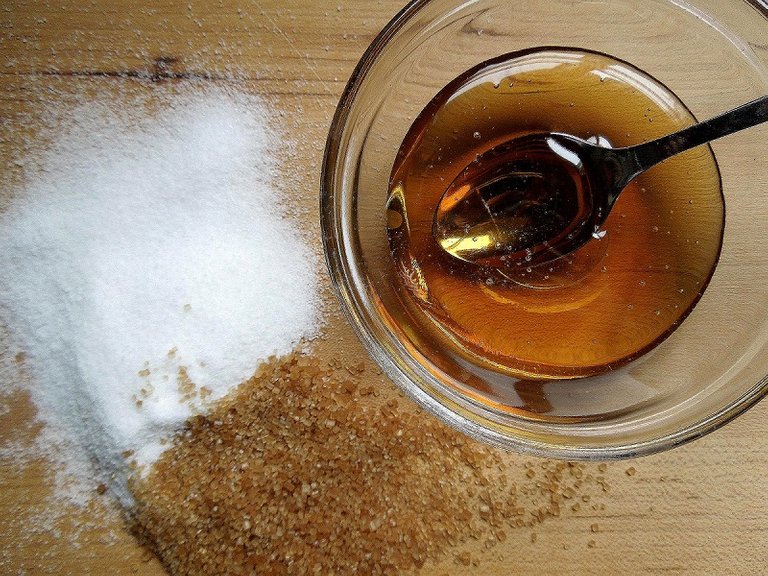
Honey is concentrated complete organic food, which contains more than 450 important for human organism substances : carbohydrates, organic acids, amino acids, proteins, minerals, vitamins, hormones, enzymes and the like.
It is known that the main component of our diet consists of carbohydrates - 4 g per kg of body weight, followed by protein - 1 g and at least - fat - 0.75, the In honey dominate simple sugars - glucose and fructose. They easily and quickly absorbed of the human body and are a valuable source of energy. One pound of honey provides energy of 315 to 335 kilocalories. With the blood glucose and fructose is transferred to the cells of the liver and peripheral tissues where undergo various transformations. Here, a part thereof is degraded, whereby releases a large amount of heat required for life processes of the body and surplus is synthesized in muscle and liver cells as a reserve carbohydrate - glycogen.
Honey contains a small quantity of sucrose and maltose, which are to be utilized, are degraded by invertase to glucose and fructose.
The sugars in honey are a number of advantages over sugar factory.

In order to render it suitable for the body, the sugar must undergo under the influence of the enzyme cleavage of simple sugars. Often these processes of degradation burden enzyme system of the body and if it is not in able to devote the necessary degradation enzymes, sugars remain unused.
Modern medicine shows refined white sugar for the enemy № 1 of today's civilized humanity primarily on the development of obesity, atherosclerosis, and coronary artery disease.
Researchers recommend daily use of copper is the golden rule of man to fight atherosclerosis and heart attacks. Proteins that contain honey, a role of building materials in the body and participate in formation of hormones and enzymes. Minerals are builders and protective substances the human body. They take part in digestion, separation of urine and sweat, and are important for formation of enzymes and hormones.
The quantity of many minerals in honey is almost as it is in the blood of man. Calcium is an integral part of the bone, the iron enters the the composition of the hemoglobin and blood. Trace elements in honey participate in normal activities many systems. For example, copper is required for normal hematopoiesis and shortage anemia develops. Iodine is necessary for normal activity of the thyroid gland. At the expense of minerals honey is a food product with an alkaline effect. This explains many the beneficial role of honey for treatment of diseases of the gastro- intestinal tract, characterized by the high acidity of gastric juice.
Enzymes in honey help the digestive processes in the body, the secretory activity of stomach and intestines, facilitating the absorption of nutrients. If breakfast is eaten slice bread, smeared with honey, then, except our own enzymes to break complex nutrients and enzymes act of honey. The organism would die in the abundance of food because without enzymes, it could not be learned from it, and the content of the honey enzymes takes one the first places among food products.
Contained in honey airy and resinous substances have on the body, especially circulatory and nervous system, slightly exciting action. Honey is very useful for people physical and mental labor, weak and recovering from serious illness.
Organic acids in honey have a favorable effect on digestion. they facilitate the absorption of nutrients and stimulates appetite, strengthen secretory function of the stomach lining.
Nutritional value of copper is increased by occupants therein vitamins, combined with other necessary substances for the body as sugars, mineral salts, enzymes and others. Therefore there easily digestible, support metabolism and other important vital body processes.
Used as food, honey is absorbed by the body 100%. He is a complete food, experience shows, held at the Medical Institute of Minnesota ( USA), where the chief doctor was subjected to four months of a diet consisting solely of milk and honey, and is felt superb.
The daily dietary intake for an adult human is from 60 to 100 g ( 1-2 g per kg bodyweight) in divided doses (morning, afternoon and evening). As food honey can be used in conjunction with other products without heat treatment.
located application in the confectionary industry for making honey breads, cookies, cakes, rolls, pastries and others. Honey may be preserved compotes, fruit, jams, marmalades, purees, juices, syrups, honey, fruit lemonades. Honey can also be used for the preparation of alcoholic beverages - mead honey wine with currants, blueberries, apples, pears, cherries, honey liqueurs strawberries apricots, lemons, oranges, etc. The greatest success in the use of honey in the culinary industry and in the preparation of soft drinks and alcoholic drinks has reached Romania.
Despite the vital importance of the honey of the human body in the world its place in rational nutrition is less marked. This is due to the still insufficient knowledge of its significance for the organism to its limited production and higher cost Compared with that of the sugar market.
Love Honey
I have to say it!